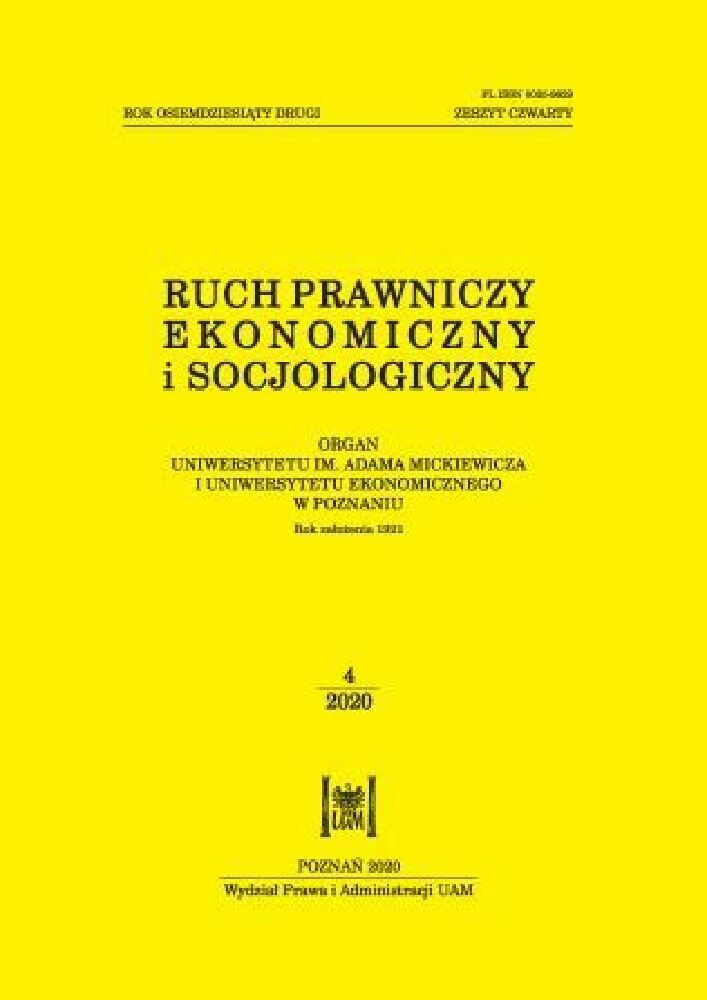Abstract
Presumption is a legal construction known in diverse branches of law – both private and public law. However, one of the aspects connected with applications of this structure in tax law is the presumption of the truthfulness of the tax declaration. This is regulated in general tax law (in the Tax Ordinance) and in special tax law (for example in the VAT law act). In making it a legal presumption, the legislator assumes the truthfulness of all the data which make up the content of the tax declaration submitted by a taxpayer. This concerns both declarations which only inform the tax administration about the tax base of a particular person, as well as declarations which include a so-called self-assessment, made by a taxpayer. The author considers the essence of presumption as a legal construction, the reason for such a regulation in the tax law, and presents its consequences. In the opinion of the author, one outcome is that the burden of proof principally falls on the tax authorities which impugn the tax declaration. It concerns all of elements of chargeable event, the fulfilment of which by a taxpayer creates the tax obligation. Therefore, the author is an opponent of dividing the burden of proof in tax law. According to this idea, some elements of tax event that are beneficial for a tax debtor, because they reduce the amount of tax (for example, costs in income tax, tax relief or input tax in value added tax) should be proven by a taxpayer. However, improving of other parts of the chargeable event would be the duty of the tax authorities.
References
Brzeziński, B., Masternak, M. (2004). O tak zwanym ciężarze dowodu w postępowaniu podatkowym. Przegląd Podatkowy 5: 56–59.
Brzeziński, B. (2005). Deklaracja podatkowa – istota i charakter prawny. Prawo i Podatki 11.
Gelger, W. (1962). Domniemanie ważności aktu administracyjnego w Kodeksie postępowania administracyjnego. Ruch Prawniczy, Ekonomiczny i Socjologiczny 24(4): 41–62.
Grzybowski, S. (1985). Prawo cywilne. Zarys części ogólnej. Warszawa.
Hanusz, A. (2006). Podstawa faktyczna rozstrzygnięcia podatkowego. Kraków.
Jakimowicz, W. (2001). Publiczne prawa podmiotowe państwa. Państwo i Prawo 51(10): 49–63.
Jakimowicz, W. (2002). Publiczne prawa podmiotowe. Warszawa.
Jurewicz, A.R. (2009). Problem domniemania w rzymskim ius quod ad personas pertinet. Olsztyn.
Kunicki, A. (1969). Domniemania w prawie rzeczowym. Warszawa.
Mariański, A. (2009). Rozstrzyganie wątpliwości na korzyść podatnika. Zasada prawa podatkowego. Warszawa.
Mastalski, R. (2019). Prawo podatkowe. Warszawa.
Masternak-Kubiak, M. (2017). Prawo do grobu jako publiczne prawo podmiotowe. Wrocławsko-Lwowskie Zeszyty Prawnicze 8: 231–241.
Morawski, L. (1981). Domniemania a dowody prawnicze. Toruń.
Morawski, W. (2009). Ulgi i zwolnienia podatkowe, [w:] B. Brzeziński (red.), Prawo podatkowe. Teoria, instytucje, funkcjonowanie. Toruń: 249–264.
Nita, A. (2007). Czynnik czasu w prawie podatkowym. Studium z dziedziny zobowiązań podatkowych. Gdańsk.
Nowacki, J. (1976). Domniemania prawne. Katowice.
Patryas, W. (2011). Próba wyjaśnienia domniemań prawnych. Poznań.
Tomaszewska, K. (2012). Znaczenie i zakres ochrony publicznych praw podmiotowych a ochrona interesu jednostki. Folia Iuridica Wratislaviensis 1: 113–134.
License
Copyright (c) 2020 WPiA UAM

This work is licensed under a Creative Commons Attribution-NonCommercial-NoDerivatives 4.0 International License.





